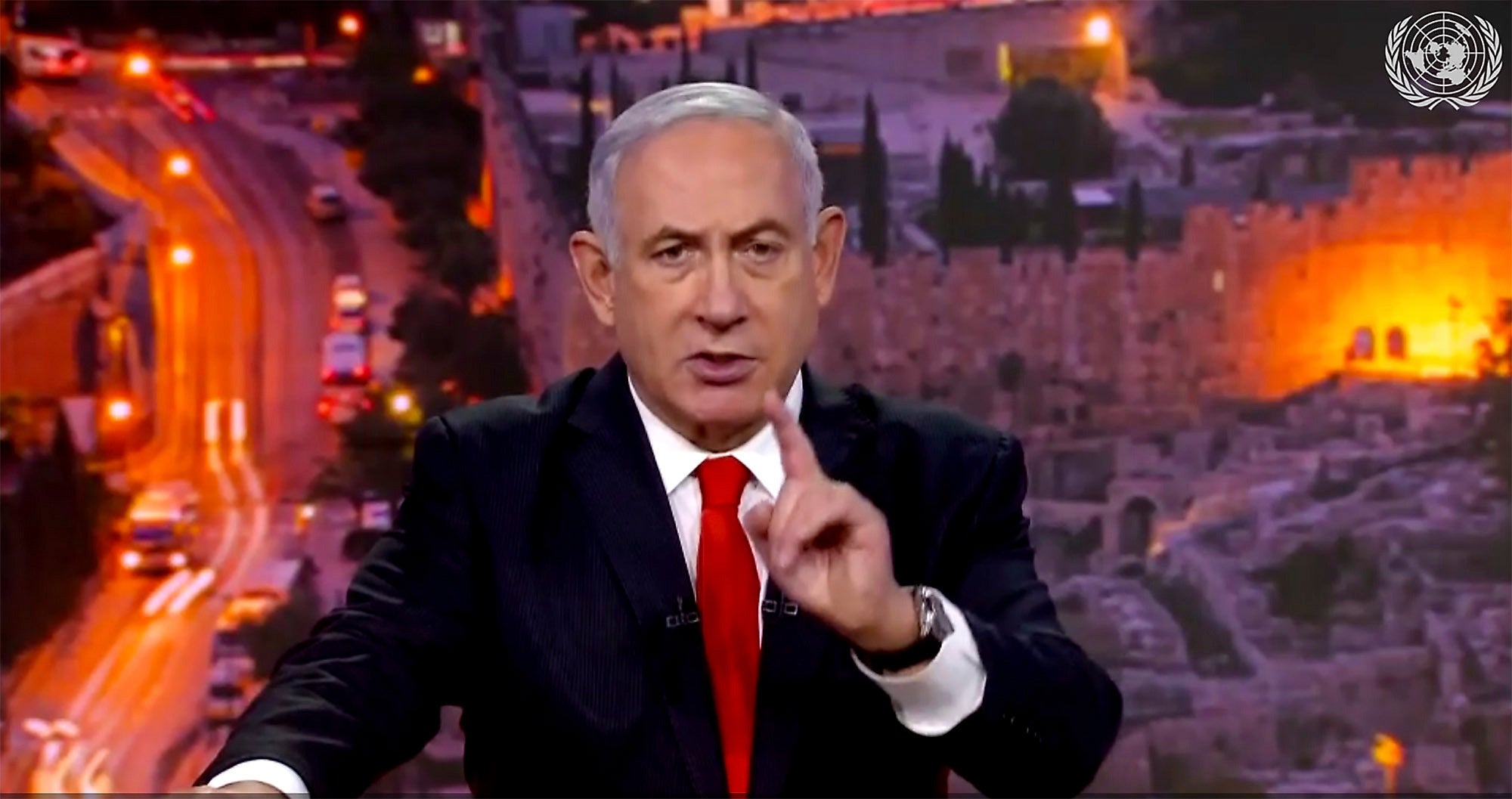Israeli PM to UN: Hezbollah storing missiles in Beirut
Israeli Prime Minister Benjamin Netanyahu has accused the Lebanese militant group Hezbollah of maintaining a “secret arms depot” in a residential neighborhood of Beirut, warning it could cause another tragic explosion in the Lebanese capital

Your support helps us to tell the story
From reproductive rights to climate change to Big Tech, The Independent is on the ground when the story is developing. Whether it's investigating the financials of Elon Musk's pro-Trump PAC or producing our latest documentary, 'The A Word', which shines a light on the American women fighting for reproductive rights, we know how important it is to parse out the facts from the messaging.
At such a critical moment in US history, we need reporters on the ground. Your donation allows us to keep sending journalists to speak to both sides of the story.
The Independent is trusted by Americans across the entire political spectrum. And unlike many other quality news outlets, we choose not to lock Americans out of our reporting and analysis with paywalls. We believe quality journalism should be available to everyone, paid for by those who can afford it.
Your support makes all the difference.Israeli Prime Minister Benjamin Netanyahu on Tuesday accused the Lebanese militant group Hezbollah of maintaining a "secret arms depot" in a residential neighborhood of Beirut, warning it could cause another tragic explosion in the Lebanese capital.
In an address to the U.N. General Assembly, Netanyahu pointed to maps purportedly showing the missile depot's location next to a gas company and residential housing. He also showed what he said was a picture of the entrance to the depot.
"Here's where the next explosion will take place, right here," he said.
“You’ve got to act now, you’ve got to protest this, because if this thing explodes, it’s another tragedy " he said, addressing the Lebanese people. "You should tell them, 'Tear these depots down.'”
Last month, a warehouse filled with nearly 3,000 tons of ammonium nitrate exploded in Beirut's port, killing nearly 200 people, wounding thousands and causing widespread destruction in the capital.
The ammonium nitrate had been stored there for several years after being removed from an impounded cargo ship. No one has yet been held accountable for the blast, which appears to have been triggered by an accidental fire.
Israel has long accused Hezbollah of storing weapons and maintaining military posts in civilian areas, especially in the southern suburbs of Beirut and southern Lebanon, both strongholds of support for the Iran-backed militant group.
The Israeli military later released maps and videos showing the site that Netanyahu had referenced as well as two other alleged missile depots it said were under residential apartment blocks. It described all three as precision-guided missile manufacturing sites.
The military provided precise locations of the alleged weapons sites, but gave no other evidence and did not say how advanced the manufacturing program is.
Israel has long warned that Hezbollah is seeking to manufacture precision-guided missiles or add guidance systems to its existing projectiles, something Israel insists is a red line that may require military action.
Hezbollah is believed to have massively expanded its arsenal in the years since it fought Israel to a month-long stalemate in 2006. Israel believes Hezbollah has tens of thousands of rockets and missiles capable of hitting virtually anywhere in Israel, but precision guidance would make them far more lethal.
Netanyahu said another depot had exploded just a few days ago in the southern Lebanese village of Ain Qana, near the port city of Sidon. It is not clear what caused that explosion, which sent smoke billowing into the sky but did not cause any casualties.
The Israeli prime minister usually uses his annual address to the United Nations to highlight Israel's concerns about archenemy Iran and its nuclear program.
And he does it in a distinctive manner. In contrast to most leaders, who typically sit behind desks or stand at podiums, he often uses visual aids such as maps and diagrams to make his points. This year, talking about potential explosions, he delivered his speech against the backdrop of a Jerusalem street scene filled with intense oranges and yellows.
This year, Netanyahu said the recent decision by the United Arab Emirates and Bahrain to normalize relations with Israel showed that Israel and Arab countries “stand together in confronting the greatest enemy of peace in the Middle East — Iran.”
Netanyahu claimed that Iran would have “enough enriched uranium in a few months for two nuclear bombs” after it recently began exceeding limits set by the 2015 nuclear deal with world powers.
Iran began publicly exceeding those limits after President Donald Trump withdrew the U.S. from the agreement and reimposed crippling sanctions on Tehran. Iran insists it has never sought nuclear weapons and that its atomic program is for civilian purposes.
Netanyahu, a staunch opponent of the nuclear deal, praised Trump's decision to withdraw from it and called on the world to follow the U.S. in snapping back sanctions.
He also reiterated his willingness to negotiate peace with the Palestinians on the basis of Trump's proposal to end the conflict, which overwhelmingly favors Israel and has been rejected by the Palestinians.